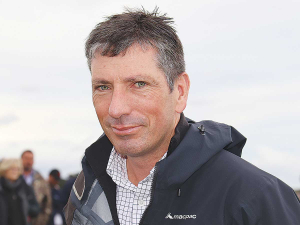Dairy power
OPINION: The good times felt across the dairy sector weren't lost at last week's Beef + Lamb NZ annual meeting.
 Sam McIvor says the report will be “alarming” for farmers, rural communities, as well as wider New Zealand.
Sam McIvor says the report will be “alarming” for farmers, rural communities, as well as wider New Zealand.
The scale of beef and sheep land purchased for forestry is higher than first thought, according to a report on land-use change.
Commissioned two years ago by Beef + Lamb NZ to track the amount of land purchased for afforestation and taken out of pastoral farming, the report from consultancy firm Orme & Associates shows that 63,582ha was purchased by forestry interests in 2021. This compared with 37,950ha in 2020 and 7,000ha in 2017 - showing a significant upwards trend in conversion.
B+LNZ chief executive Sam McIvor says the report will be "alarming" for farmers, rural communities and wider New Zealanders already concerned about the conversion of food producing sheep and beef land into carbon farming.
"This takes the total to more than 200,000ha of sheep and beef farms bought over the last five years," he says.
"This scale of change is far more than what is recommended by the Climate Change Commission (25,000ha per year to meet the net zero by 2050 target) and will have a negative impact on rural communities, food production and export income, which affects all New Zealanders."
MPI’s Afforestation and Deforestation report, focusing on larger scale planting, also supports B+LNZ’s findings. Afforestation for 2023 was estimated to be 88,000ha in 2023, with 16% set aside for permanent forestry – though the impacts of Cyclone Gabrielle will likely muddy these numbers.
Uncertainty over policy changes led to a decrease to 36,000ha in 2022, but McIvor says this figure is likely to increase because there is a backlog of applications sitting with the Overseas Investment Office (OIO).
“New Zealand is one of the only countries in the world that allows fossil fuel emitters to offset 100% of their emissions,” he says.
“B+LNZ is not antiforestry; there is absolutely a place for it and for offsetting. We know many farmers are interested in integrating trees into their farms, but there is a need for some balance.”
McIvor says B+LNZ also recognises the unique circumstances of some Māori landowners who can never sell their land, where this is a legitimate instance of where carbon credits from offsetting should be available.
A previous independent report commissioned by B+LNZ found that only Kazakhstan also offer 100% offsetting from forestry in their equivalent ETS scheme. However, Kazakhstan’s landscape makes that more of a theoretical scenario.
Most countries that allow forestry offsetting for equivalent schemes have a 4-10% limit for compliance obligation.
McIvor says that while forestry can and does create jobs and export revenue, carbon farming does not.
“Production forestry, in combination with carbon forestry, can often be integrated into sheep and beef farms without loss of food production,” he adds.
“The Government is currently consulting on changes to the Emissions Trading Scheme and must urgently work with the sector to implement limits before it’s too late.”
Former Fonterra executive Alex Turnbull has been appointed CEO to lead all five Yili Oceania Business Division companies in New Zealand.
Fonterra executive René Dedoncker is leaving the co-operative later this year to lead Australian agribusiness Elders.
Alliance Group and the Southland Stags rugby team have joined forces in a partnership that will see the the meat co-operative's farmgate brand feature on players' team kits and replica jerseys.
Fonterra's plan to expand its organic programme to the South Island is being well received by farmers, the co-op says.
Voting has started for the renewal of DairyNZ's milksolids levy.
The most successful catchment groups in NZ are those that have 'a source to sea' approach.

OPINION: Here w go: the election date is set for November 7 and the politicians are out of the gate…
OPINION: ECan data was released a few days ago showing Canterbury farmers have made “giant strides on environmental performance”.